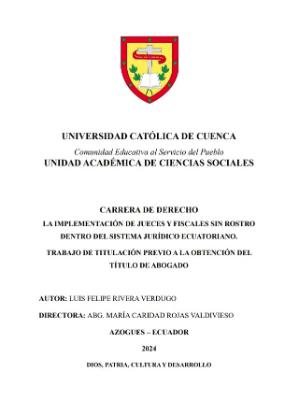
|
La implementación de jueces y fiscales sin rostro dentro del sistema jurídico ecuatoriano
Ell siguiente trabajo de investigación científica se basó en un estudio teórico y jurídico de jueces y fiscales sin rostro, con el objetivo de analizar la necesidad de implementar la figura de jueces y fiscales sin rostro en Ecuador, teniendo como referencia a países como Colombia e Italia, los cuales adoptaron este método de administrar justicia por el hecho de que hace tiempo vivían un nivel de inseguridad tan elevada como la que sufre el Ecuador hoy en día. Consecuentemente, se realizó entrevistas en relación a este tema a profesionales del derecho que ejercen cargos en la administración de justicia, como resultado de dichas entrevistas se recolectó información del conocimiento que tienen jueces y fiscales sobre este tema, y que opinan que se incorpore este método en la legislación ecuatoriana, ya que dichos profesionales son a los que se desea proteger con este sistema de administrar justicia, puesto que han existido varios atentados a jueces y fiscales a nivel nacional, con el propósito de que se suspenda la sustanciación de los procesos en contra de grandes mafias que existen dentro del Ecuador. Para concluir, con las entrevistas realizadas a profesionales del derecho y más el análisis de derecho comparado y puntos de vista dogmáticos, se pudo determinar cómo realizar la inserción de jueces sin rostro en el Código Orgánico de la Función Judicial del Ecuador, mediante una reforma al mismo, estableciéndolo como un método alternativo de administrar justicia especializada dentro de la legislación ecuatoriana.
|
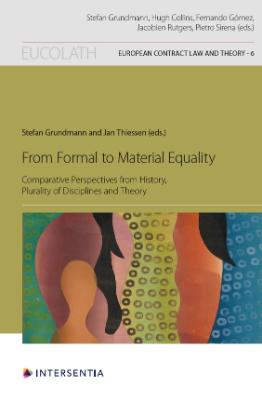
|
From Formal to Material Equality : Comparative Perspectives from History, Plurality of Disciplines and Theory
Equality has been seen as the core of any quest of justice since Aristotle's Nicomachian Ethics. Reaching not only situational equality, but equality in status, however, had not been achieved until modern times. The father of ethics and his systematic enquiry into the concept of justice did not have any problems with foreigners without rights, women as second-class citizens and enslaving people - nor did antiquity at large, medieval era or even the high renaissance. While suum cuique (treating equal issues equally and unequal issues unequally) had been in place since antiquity and Cicero, personal status still had to wait to be recognised as a target of equality concerns. Related to this, no agenda was designed for achieving a paradigm reaching beyond mere formal equality, which only implies treating same things formally the same, and the material quest for equality has come to the fore as a vision only very recently. This book explores these issues - from general equality to equality also in personal status, hence also anti-discrimination, and the change from formal to material concepts of equality - in time and in theoretical approaches. In time, it describes firstly how the equality of indigenous people in Latin America was originally developed as a postulate on the basis of the Bible (all men are similar to God) and from that also as a postulate of equality in law.
|
|
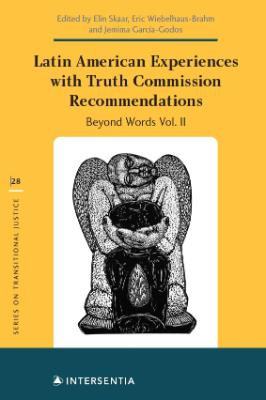
|
Latin American Experiences with Truth Commission Recommendations: Beyond Words
Truth commission recommendations are critical to their legacies, yet there is little research examining their fates. Based on fieldwork that is unprecedented in scope, this double volume project provides the first systematic study of the formulation and implementation of the recommendations of thirteen Latin American truth commissions. Beyond Words Vol. II is a unique collection of 11 Latin American country studies covering all 13 formal truth commissions established in this region that submitted their final reports between 1984 and 2014. Based on qualitative original data and a common analytical framework, the main focus of each of the country chapters is threefold: (1) to provide a brief background to the truth commission(s); (2) to provide a detailed account of the formulation of the truth commission’s recommendations; and (3) to analyze the implementation record of the recommendations, taking into account the actors and factors that have aided – or obstructed – the implementation process.
|
|
|
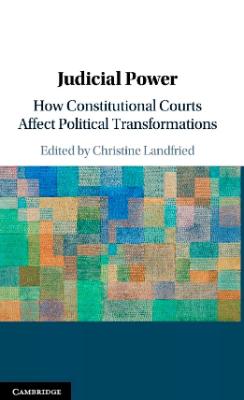
|
Judicial power: How constitutional courts affect political transformations
The power of national and transnational constitutional courts to issue binding rulings in interpreting the constitution or an international treaty has been endlessly discussed. What does it mean for democratic governance that non-elected judges influence politics and policies? The authors of Judicial Power - legal scholars, political scientists, and judges - take a fresh look at this problem. To date, research has concentrated on the legitimacy, or the effectiveness, or specific decision-making methods of constitutional courts. By contrast, the authors here explore the relationship among these three factors. This book presents the hypothesis that judicial review allows for a method of reflecting on social integration that differs from political methods, and, precisely because of the difference between judicial and political decision-making, strengthens democratic governance. This hypothesis is tested in case studies on the role of constitutional courts in political transformations, on the methods of these courts, and on transnational judicial interactions.
|
|
|

|
Gender and environmental education: Feminist and other(ed) perspectives
This timely book provides a starting point for critical analysis and discourse about the status of gendered perspectives in environmental education research.Through bringing together selected writings of Annette Gough, it documents the evolving discussions of gender in environmental education research since the mid-1990s, from its origins in putting women on the agenda through to women’s relationships with nature and ecofeminism, as well as writings that engage with queer theory, intersectionality, assemblages, new materialisms, posthumanism and the more-than-human. The book is both a collection of Annette Gough, and her collaborators, writings around these themes and her reflections on the transitions that have occurred in the field of environmental education related to gender since the late 1980s, as well as her deliberations on future directions. An important new addition to the World Library of Educationalists, this book foregrounds women, their environmental perspectives, and feminist and other gendered research, which have been marginalised for too long in environmental education.
|
|
|
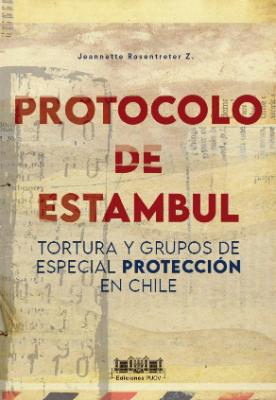
|
Protocolo de Estambul
: Tortura y grupos de especial protección en Chile
La actualización del Protocolo de Estambul presentada en 2022 por la Alta Comisionada de Naciones Unidas para los Derechos Humanos es la materialización de un proceso de aprendizaje y crecimiento respecto a la mejor manera de apoyar a las personas que han sufrido tortura respecto a sus necesidades de reconocimiento, reparación, rehabilitación y garantías de no repetición. En esta nueva versión se incorpora orientación para actores relevantes como jueces, fiscales y profesionales de la salud. Como señaló la Alta Comisionada en la presentación de la nueva versión estamos frente a una batalla que estamos lejos de ganar, agregando que en el año 2021 el Fondo de contribuciones voluntarias de las Naciones Unidas para las víctimas de la tortura proporcionó asistencia a 47.000 víctimas de la tortura y a sus familiares en 79 países. Uno de los elementos relevantes de esta nueva versión tiene que ver con el énfasis puesto en que las personas responsables de dichos actos rindan cuenta de ellos y, por otra parte, en el hecho de que las víctimas tengan acceso a las medidas de reparación. En esta nueva versión 2022 participaron más de 180 especialistas de 51 países y fue dirigido por representantes de cuatro organizaciones de la sociedad civil y cuatro órganos contra la tortura de las Naciones Unidas.
|
|
|
|
|